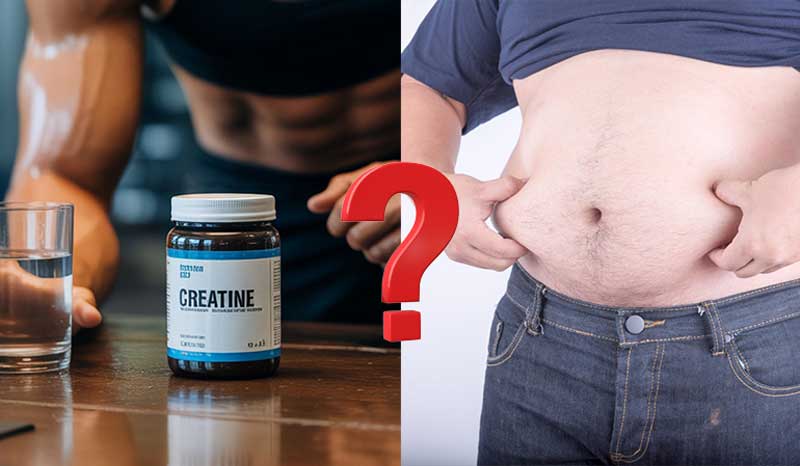Does Creatine Make You Fat? Myth vs. Reality
Creatine is one of the most popular supplements in the fitness world, trusted by bodybuilders, athletes, and fitness enthusiasts for decades.
Yet, many people in India still wonder: Does creatine make you fat?
What is Creatine and Why Do People Use It?
Creatine is a natural compound found in small amounts in foods like red meat and fish. Our bodies also produce it in the liver, kidneys, and pancreas.
However, the amount we get from diet and natural production is often not enough to maximize muscle performance. This is why creatine supplements are popular.
When taken as a supplement, creatine increases the stores of phosphocreatine in muscles.
This helps produce more adenosine triphosphate (ATP), which is the main energy source for short bursts of high-intensity exercise such as weightlifting, sprinting, or explosive movements.
In India, with the growing interest in gym culture, weight training, and sports like cricket or athletics, creatine has gained traction.
Many young Indians use creatine to improve strength, enhance recovery, and build muscle mass faster.
Why do People Think Creatine Makes Them Fat?
Creatine does not make you fat. It may cause slight water retention in muscles, but it does not increase body fat.
The myth that creatine makes you fat often comes from a misunderstanding of how the supplement works.
Here are the main reasons behind this belief:
-
Water Retention: Creatine draws water into your muscle cells. This can make muscles appear fuller and sometimes cause slight bloating, especially during the initial loading phase.
-
Rapid Weight Gain: Many people notice a 1-2 kg increase in body weight within the first week of creatine use. This is not fat but simply water stored inside the muscles.
-
Lack of Knowledge: In India, supplements are still sometimes viewed with suspicion. People often confuse weight gain from water retention with body fat increase, fueling the myth.
The truth is simple: creatine itself has no calories, so it cannot directly increase fat. The only way to gain fat is by consuming more calories than your body burns.
Does Creatine Increase Body Fat? The Science Explained
To answer directly: No, creatine does not increase body fat. Let us break it down scientifically.
-
No Calories in Creatine: Unlike protein powders, mass gainers, or food, creatine does not provide energy in the form of calories. Therefore, it cannot contribute to fat storage.
-
Increased Lean Muscle Mass: Studies have shown that creatine helps increase lean body mass, not fat mass. The extra weight you see is due to muscle growth and water retention inside the muscles, not fat accumulation.
-
Enhanced Training Performance: Since creatine boosts energy for high-intensity workouts, it often helps people lift heavier weights or complete more repetitions.
So, if your goal is fat loss, creatine can indirectly support it by improving your workouts. The temporary weight gain from water retention should not be mistaken for fat.
Creatine and Indian Diets: What You Should Know
Indian diets are diverse and vary greatly depending on region, culture, and religion.
For those following vegetarian diets, which are common in India, creatine supplementation can be particularly beneficial.
-
Low Natural Creatine in Vegetarian Diets: Since creatine is mainly found in meat and fish, vegetarians typically have lower muscle creatine stores. This makes supplementation more effective and noticeable for them.
-
Compatibility with Indian Foods: Creatine can be taken with water, milk, or juice, making it easy to fit into Indian eating habits.
-
No Religious Restrictions: Creatine supplements are synthetic and not derived directly from animals, so they are acceptable for vegetarians and even vegans.
For Indian athletes or fitness enthusiasts, creatine is a safe and effective way to improve performance, regardless of dietary restrictions.
Managing Water Retention and Avoiding Bloating
While creatine does not make you fat, water retention can sometimes cause discomfort. Here’s how to manage it:
✔️ Stay Hydrated
Since creatine pulls water into your muscles, drinking enough water throughout the day prevents dehydration and reduces bloating.
✔️ Skip the Loading Phase
Traditionally, creatine use starts with a loading phase of 20 grams per day for 5-7 days. This causes rapid water retention.
Instead, you can start with a smaller daily dose of 3-5 grams, which reduces bloating while still providing benefits over time.
✔️ Balanced Diet
Avoid excessively salty and processed foods, which can worsen water retention. Instead, focus on whole foods like fruits, vegetables, dal, rice, and roti.
✔️ Regular Exercise
Staying active helps manage body weight and reduces the chances of feeling puffy or bloated.
The Final Verdict
Whether you are a college student starting gym workouts, a professional athlete, or someone trying to stay fit, creatine can support your goals without making you gain unwanted fat.
The key is to use it correctly, stick to a daily dose of 3-5 grams, stay hydrated, and continue eating a balanced Indian diet.
Remember, fat gain only comes from consuming more calories than your body needs, not from creatine itself.


